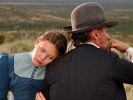Eye For Film >> Movies >> Jauja (2014) Film Review
Jauja
Reviewed by: Jennie Kermode

Lying in her lover's arms, out in the immensity of the pampas, Ingeborg (Viilbjørk Malling Agger) is struck by the sense that all this has happened before. It's a moment of self awareness that seems to propel her into a position of unexpected mastery in a shifting narrative. She might be remembering dozens of similarly eloped or otherwise lost girls in dozens of films - even director Alonso's own Los Muertos, set a century ahead of where she finds herself. Perhaps she embodies all of them. In this year Virginia Woolf is born, married Englishwomen gain the right to own property, and the term feminism is used for the first time (in French journal La Citoyenne). Ingeborg's awakening in a narrative traditionally dominated by men propels her, like Picnic At Hanging Rock's Miranda, into unknowable places.
Although she is absent throughout most of the film it is Ingeborg who dominates the story, her presence or absence a clear point of focus for the male characters. The young soldier, her beloved, is thinly drawn, his body sufficient for the role he must play, his thoughts of little consequence. The older lieutenant who desires her provides both threat and comedy, as he is destined to be of little consequence. Her father, the military engineer Dinesen, is wholly obsessed by her. Perhaps at times this seems unhealthy, but their first scene together, when she asks him for a puppy, shows them clearly as parent and child, his protectiveness and sense of guardianship stronger because of the strange landscape around them.

"What kind of dog do you want?" he asks.
"One that will follow me around."
In 1882, the Europeans had almost succeeded in driving out, killing or subduing the indigenous people of the plains. Dinesen, ably played by Viggo Mortensen, is there to survey the land and make way for settlers. There's no prospect of him settling there himself - he yearns to return to Denmark - but Ingeborg, growing up in Patagonia, has become something different. The ease with which she moves through wild places only serves to emphasise Dinesen's vulnerability as, propelled by her flight, he sets out to track her down. For all the arrogance he shows toward employees and others encountered along the way, he is a man increasingly losing control. But this is not The Searchers. It is not Ingeborg for whom we fear.
Stunningly shot by cinematographer Timo Salminen, who illuminates landscapes as if they were Eckersberg paintings, the film is framed in 4:3 aspect ratio, creating the sense that there's always something just out of sight - perhaps a threat, perhaps a gateway to the promised land known as Jauja. Perhaps we are already there but only Ingeborg can see it. In her wake, the hapless Dinesen falls prey to all nature's jokes and the film unravels into a deliberate absurdity. Some viewers will lose their way, but there is no doubting that Alonso has created a remarkable piece of cinema.
Reviewed on: 24 Feb 2015

















